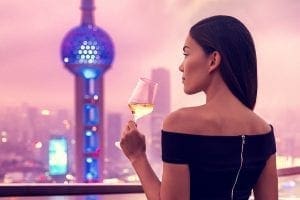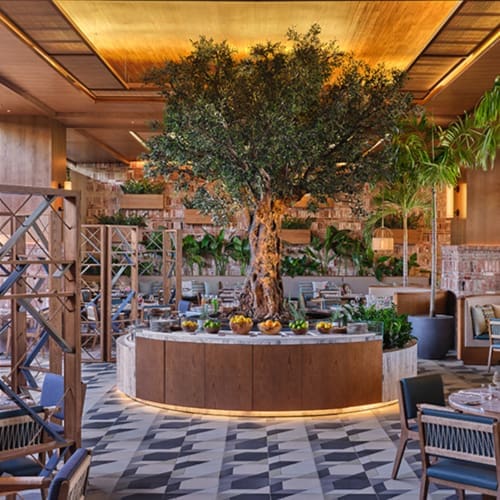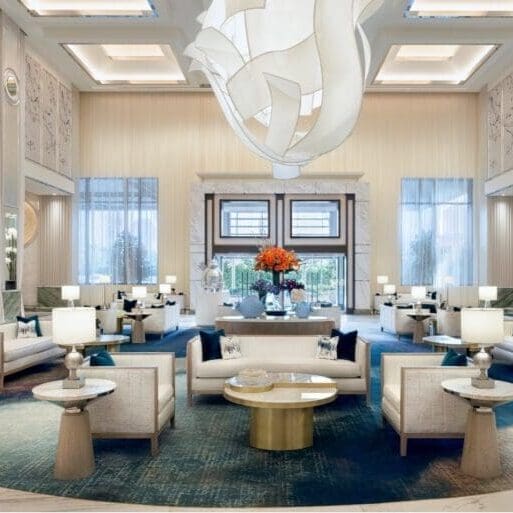 Social media may be the best way for luxury hotels to tap in to China’s enormous consumer market, according to a recent study co-authored by Mr Xinhai Mou, Dr Lisa Gao of the School of Hotel and Tourism Management (SHTM) at The Hong Kong Polytechnic University and a co-author. The global luxury sector is growing, and in an era of information overload, platforms such as WeChat and YouTube enable hotel managers to bring luxury experiences vividly to life. Drawing on a sample of affluent Chinese consumers, the researchers show how luxury hotel managers can develop curated social media content to meet the needs of the world’s biggest market for luxury travel.
Social media may be the best way for luxury hotels to tap in to China’s enormous consumer market, according to a recent study co-authored by Mr Xinhai Mou, Dr Lisa Gao of the School of Hotel and Tourism Management (SHTM) at The Hong Kong Polytechnic University and a co-author. The global luxury sector is growing, and in an era of information overload, platforms such as WeChat and YouTube enable hotel managers to bring luxury experiences vividly to life. Drawing on a sample of affluent Chinese consumers, the researchers show how luxury hotel managers can develop curated social media content to meet the needs of the world’s biggest market for luxury travel.
Living extravagantly is becoming a new reality for many, the researchers observe, as a rise in disposable income worldwide fuels the growth of the luxury sector. Few market segments offer a more promising target for luxury brands than China, whose consumers represent more than a third of the global luxury market. Hotels are no exception. To take advantage of this enormous market, hotel brands need to attract affluent Chinese travellers who seek unique, personalised accommodation experiences.
The first task is to understand what motivates Chinese consumers to purchase luxury products and services. “In China, material success has become an essential indicator of achievement”, the researchers tell us. “Consumers are motivated to purchase luxury products to gain respect or dignity and improve their social status”. The researchers term this motivation “need for status” (NFS). Compared with their Western counterparts, Chinese consumers generally engage in more conspicuous consumption and have a greater NFS.
However, the researchers warn that the situation may be more complex than it seems. Despite attaching great value to the social benefits of luxury purchases, Chinese consumers have surprisingly limited knowledge of luxury brands. Younger generations and more experienced consumers may not even view luxury as a marker of social status. Yet despite these important differences, “little research in the tourism and hospitality setting specifically investigates Chinese luxury consumers’ behaviours”. To help hotels understand this growing market segment, the researchers set out to explore how Chinese consumers with different levels of NFS view luxury hospitality consumption.
No study of modern luxury hospitality would be complete without considering social media, which have revolutionised the interaction between luxury hotels and their customers. Astonishingly, the researchers write, “more than half of luxury purchases are influenced by others’ experiences reported on social media”. By posting on platforms such as WeChat, Weibo and YouTube, hotels can share their facilities, décor and services with thousands and even millions of users. Meanwhile, uploading pictures and videos to social media enables consumers to impress others by displaying tangible evidence of their luxury consumption experiences. “For example”, note the researchers, “celebrities may post pictures of luxury hotel experiences such as high tea” to show off their elegant and extravagant lifestyles.
Why do social media offer such a good way to market luxury hotel experiences? The researchers explain this in terms of the sights, smells, sounds and tastes conjured in our minds by a particularly evocative image or description. Watching a YouTube video of your favourite celebrity enjoying afternoon tea at a five-star hotel might make you hungry for more than just cucumber sandwiches. “If consumers imagine themselves having enjoyable experiences at luxury hotels”, the researchers explain, “they are highly likely to feel the urge to book stays at such establishments”.
When consumers search online for information on luxury hotels, the kind of content they see may affect the images that form in their minds. For example, close-up photos or videos give consumers the sense that they are completely immersed in what they see, whereas wide-angle photos shot from a distance offer a more detached view. Consumers who wish to impress others with their luxury purchases may be particularly attracted to close-up images that provide a firstperson perspective on hotels’ high-end furnishings, well-appointed spa facilities, Michelin-starred dishes and so on.
To test these ideas, the researchers first created a series of social media style photos intended to vividly convey the experience of enjoying afternoon tea at a luxury hotel. Some were taken from a first-person perspective. “They were close-up shots of the delicate workmanship of the porcelain and delicious desserts, with no actors in the field”. The rest were taken from a thirdperson perspective. They showed the dishes and cutlery on the table, the diners and the surrounding environment.
Next, the researchers showed the photos to 200 Chinese consumers. As they had all experienced luxury services in the last two years, from fine dining to first-class flights, the participants were defined as “affluent consumers who could afford to engage in luxury consumption”. They were all familiar with social media. In a questionnaire, they were asked to indicate how immersed they felt in the scenes shown in the photos, and whether they would be likely to recommend the hotel to others.
The researchers carefully analysed the participants’ responses to examine the intentions of realworld affluent Chinese consumers to seek out luxury hotel experiences after viewing social media photos of luxury hotels. Their findings have important practical implications for managers of luxury hotels in the new era of Chinese tourism.
As expected, the participants who wished to impress others with their luxurious lifestyles preferred the close-up photos of the hotel. For affluent consumers with a high NFS, the researchers explain, “viewing images from the first-person perspective significantly increases their intention to engage in luxury hospitality consumption”. In contrast, photos of hotels are unlikely to have much effect on affluent customers who lack the desire for social status, “because they do not feel the need to distinguish themselves from less affluent consumers”. They view luxury consumption as a normal, everyday activity.
As consumers with a high NFS make up a big part of China’s luxury market, efforts to understand their behaviour and meet their needs have high commercial value. To attract well-off Chinese hotel guests keen to distinguish themselves from others, write the researchers, “hospitality companies are encouraged to create immersive and vivid information for consumers online”. When sharing photos and videos on social media, they should focus on capturing the tangible aspects of the luxury experiences their hotels provide, such as furniture, food and amenities.
In China today, increasingly more celebrities are posting photos of their experiences at luxury hotels on social media. These posts serve as “subtle hotel advertisements”, the researchers tell us. To stay ahead of the curve, luxury hotel managers and marketers could invite celebrities and key opinion leaders to post photos of their hotels from a first-person perspective. This would encourage affluent Chinese consumers to form concrete mental images of luxury hotel consumption, making them more likely to book a stay in the future. “The potential power of social media to influence final hospitality-related consumption decisions should not be ignored”, conclude the researchers.
Luxury hotels have emerged as a niche segment in the global travel sector, making a sizeable contribution to total hotel revenue in recent years. Although luxury hotels may still be the stuff of daydreams for many, they are becoming more affordable for China’s enormous and increasingly affluent consumer base. This study not only shows luxury hotel managers how to capitalise on the world’s biggest market, but may also shed light on the path ahead in a time of global uncertainty. The most effective kind of luxury tourism today, suggest the researchers, is “aesthetic”, “escapist” and “immersive”, and this can be realised through the right social media strategies.
About the authors
Xinhai Mou, Lisa Gao and Wan Yang (2019). The Joint Effects of Need for Status and Mental Imagery Perspective on Luxury Hospitality Consumption in China. Journal of Travel and Tourism Marketing, Vol. 36, Issue 9, pp. 1050-1060. Website : http://shtm.polyu.edu.hk



















